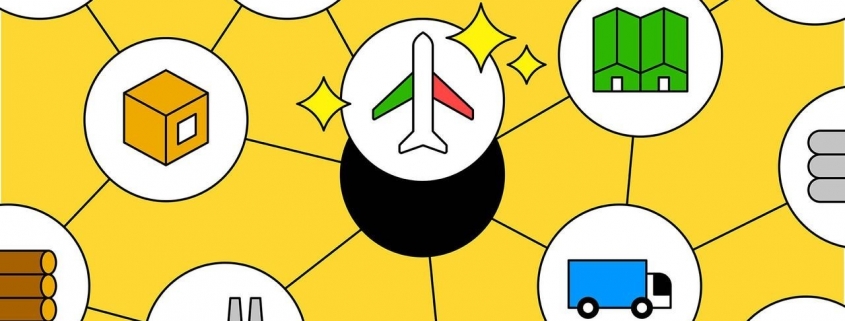The chunks metal being worked on do not look terribly special. But the factory of Aerospace, a chemical-processing firm in Tijuana, hints at Mexico’s importance to global supply chains. These are components, from tray tables to door parts, for aircraft made by companies including Boeing, Cessna and Lockheed Martin. BAP applies surface treatments to the pieces, from submerging them in big vats of chemicals to meticulous work done by hand, before shipping them north.
Mexico has long been a hub for manufacturing. Toyota, a Japanese carmaker, has had a plant in Tijuana since 2002. Honeywell, an American industrial giant, opened one in 2010. But increasingly the country is moving into higher-value processes. It now accounts for 3-4% of aerospace imports to the United States, up from 1.5% in 2010. By contrast China’s share, which was the same as Mexico’s a decade ago, is now just 1%. American sanctions on China and tariffs on Chinese goods explain much of this change, as well as rising wages in China and the difficulty of doing business there. The trend has accelerated recently. Pandemic-induced border closures, increased freight costs, and consumers’ demands for instant gratification have all nudged firms around the world to consider shortening their supply chains.
“This is a golden opportunity for Mexico,” says Helen Wang, a consultant. The country has some natural advantages, not least a long land border with the United States. Mexico is party to fully 23 free-trade deals. Manufacturing wages are lower than in China. A survey this year by the American Chamber of Commerce of Shanghai found that a fifth of its members were considering moving some work out of China; more than a third of those who were thinking of moving were looking to Mexico.
In Tijuana the mood among many Mexican businesspeople is optimistic. Several big firms have expanded recently. Panasonic, a Japanese electronics company, opened a plant in 2018 to make cables for aerospace. Other companies are diversifying into logistics and distribution. In September this year Amazon, an e-commerce giant, opened a warehouse there, though the company denied that it would use it to serve customers in the United States.
In addition to aerospace, the manufacturing of medical devices and other electronics is booming. “We are doing things [in Mexico] that once would have had to be done in Japan or Germany,” boasts Eduardo Salcedo, the manager of the local operations of Össur, an Icelandic medical-devices company. “We have guys running a million-dollar machine with their right hand and another one with their left hand.”
Chain reaction
The result is that the richest part of the country, by the border, is becoming even better off. “Northern Mexico is growing at similar rates to Asia,” says Luis de la Calle, a consultant who used to work at Mexico’s economy ministry. Elsewhere, however, the picture is mixed. FDI fell from 3.1% of GDP in 2018 to 2.3% in 2019, compared with 3.7% in Brazil or 6.2% in Vietnam.
And despite its proximity to the United States, Mexico has its shortcomings. Business parks provide world-class facilities but the infrastructure outside—from roads to ports—is of poor quality, says Mr de la Calle. Businesses complain of problems obtaining inputs. The likes of Panasonic and Össur import many of the materials they need. Similarly Össur nearly pulled out of Tijuana because it could not find a company to apply chemical processes to its products, which include prosthetics. (BAP eventually stepped in.)
Some of the causes of Mexico’s problems are outside its control. When the government of the United States talks about “near-shoring”, it really means onshoring, says Bill Reinsch of CSIS, a think-tank in Washington. It can be protectionist in negotiations with Canada and Mexico. USMCA, the revised trade deal agreed in 2020 between the three countries, is stricter than its predecessor, NAFTA—indeed it was negotiated in part to preserve manufacturing jobs in the United States.
But Andrés Manuel López Obrador, Mexico’s populist president, has not helped. In 2018 his administration replaced one of the most business-friendly (if corrupt) governments in Mexico’s history, that of Enrique Peña Nieto. Mr López Obrador, in contrast, seems to enjoy unnerving investors.
Soon after taking office he cancelled a new airport for Mexico City, after the diggers had been working for three years, at a cost of at least $5bn. In 2020 he also pulled the plug on a $1.4bn investment in a new factory by Constellation Brands, an American brewer, which was near completion. He has weakened independent regulators by absorbing them into government or slashing their budgets.
Mr López Obrador is also reversing his predecessor’s opening of the energy industry to private firms and favouring inefficient state-owned outfits. Along with making electricity dirtier and less reliable, this sends forbidding signals to investors. In November the boss in Mexico of General Motors (GM), an American carmaker, said the company would not invest further in the country without laws that promote renewable energy. Earlier this year GM had said it would invest more than $1bn to make electric cars in Mexico from 2023. Last year Tesla, a leading maker of such cars, considered opening a factory in Mexico but opted instead for Texas. Although Tesla did not explain its reasons, Elon Musk, its boss, has grumbled about the Mexican government’s closure of some of the factories of its suppliers during covid-related lockdowns.
Mexico risks “shooting itself in the foot” by not taking advantage of shorter supply chains, says Michael Camuñez, who started a series of meetings to boost the economic relationship between Mexico and the United States during Barack Obama’s administration. (Mr López Obrador and President Joe Biden relaunched this “economic dialogue” in September.) Unfortunately it is Mr López Obrador who has his finger on the trigger and, if his past treatment of foreign investors is any guide, seems likely to pull it.




